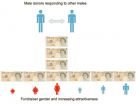(Press-News.org) Washington, DC--Drinking sugar-sweetened beverages can suppress the hormone cortisol and stress responses in the brain, but diet beverages sweetened with aspartame do not have the same effect, according to a new study published in the Endocrine Society's Journal of Clinical Endocrinology & Metabolism.
"This is the first evidence that high sugar - but not aspartame - consumption may relieve stress in humans," said one of the study's authors, Kevin D. Laugero, PhD, of the University of California, Davis, and the U.S. Department of Agriculture's Agricultural Research Service. "The concern is psychological or emotional stress could trigger the habitual overconsumption of sugar and amplify sugar's detrimental health effects, including obesity."
About 35 percent of adults and nearly 17 percent of children nationwide are obese, according to the Society's Endocrine Facts & Figures report. Sugary drinks such as soda and juice have been linked to this problem. Half of the U.S. population consumes sugar-sweetened drinks on any given day, according to the U.S. Centers for Disease Control and Prevention.
The parallel-arm, double-masked diet intervention study examined the effects of consuming sugar- and aspartame-sweetened beverages on a group of 19 women between the ages of 18 and 40. The researchers assigned eight women to consume aspartame-sweetened beverages, and 11 to drink sugar-sweetened beverages. For a 12-day period, the women drank one of the assigned beverages at breakfast, lunch and dinner. The participants were instructed not to consumer other sugar-sweetened drinks, including fruit juice.
For 3.5 days prior to and after the study, the women consumed a standardized low-sugar diet and stayed at the UC Davis Clinical and Translational Science Center's Clinical Research Center.
Before and after the 12-day experimental period, the women underwent functional MRI screenings after performing math tests to gauge the brain's stress response. The participants also provided saliva samples to measure levels of cortisol - a hormone made by the adrenal glands that is essential for the body's response to stress.
The researchers found women who drank sugar-sweetened beverages during the study had a diminished cortisol response to the math test, compared to women who were assigned to consume aspartame-sweetened beverages. In addition, the women who consumed sugar-sweetened beverages exhibited more activity in the hippocampus - a part of the brain that is involved in memory and is sensitive to stress - than the women who drank aspartame-sweetened beverages.
The hippocampus typically is less active when the body is under stress. When the study participants drank sugar-sweetened beverages, this response was inhibited. The findings offer new clues that help explain how sugar positively reinforces the temptation to eat comfort food when a person is stressed, Laugero said.
"The results suggest differences in dietary habits may explain why some people underreact to stressful situations and others overreact," he said. "Although it may be tempting to suppress feelings of stress, a normal reaction to stress is important to good health. Research has linked over- and under-reactivity in neural and endocrine stress systems to poor mental and physical health."
INFORMATION:
Other authors of the study include: Matthew S. Tryon, Kimber L. Stanhope, Valentina Medici and Peter J. Havel of the University of California, Davis in Davis, CA; and Elissa S. Epel, Ashley E. Mason and Rashida Brown of the University of California, San Francisco in San Francisco, CA.
The study, "Excessive Sugar Consumption May Be a Difficult Habit to Break: A View from the Brain and Body," will be published online at http://press.endocrine.org/doi/10.1210/jc.2014-4353, ahead of print.
For more information on the high costs of junk food, visit the Hormone Health Network's website.
Founded in 1916, the Endocrine Society is the world's oldest, largest and most active organization devoted to research on hormones and the clinical practice of endocrinology. Today, the Endocrine Society's membership consists of over 18,000 scientists, physicians, educators, nurses and students in 122 countries. Society members represent all basic, applied and clinical interests in endocrinology. The Endocrine Society is based in Washington, DC. To learn more about the Society and the field of endocrinology, visit our site at http://www.endocrine.org. Follow us on Twitter at https://twitter.com/#!/EndoMedia.
Washington, DC--People who have osteoporosis face a 1.76-fold higher risk of developing sudden deafness than those who do not have the bone disease, according to a new study published in the Endocrine Society's Journal of Clinical Endocrinology & Metabolism.
Osteoporosis is a progressive condition in which bones become structurally weak and are more likely to fracture or break, according to the Hormone Health Network. More than 40 million people nationwide already have osteoporosis or are at risk of developing the condition due to low bone mass, according to the National ...
This news release is available in French. Quebec City, April 16, 2015--An international study led by researchers from Université Laval and CHU de Québec-Université Laval has identified significant vascular changes in the brains of people with Huntington's disease. This breakthrough, the details of which are published in the most recent issue of Annals of Neurology, will have significant implications for our understanding of the disease and could open the door to new therapeutic targets for treating this fatal neurodegenerative condition.
Huntington's ...
If you are looking to raise money online for your favorite cause, listen up. A real-world analysis of human behavior reported in the Cell Press journal Current Biology on April 16 shows that men treat online giving as a competitive enterprise. Men will donate four times more money to an attractive female fundraiser in response to the contribution of another male.
Researchers say that they suspect this tendency is a subconscious part of human psychology that exists because it is (or was) evolutionarily beneficial to us.
"People are really generous and are right, a lot ...
The body plan of octopuses is nothing if not unique, with a sophisticated brain in a soft, bilaterally symmetrical body, encircled by eight radially symmetrical and incredibly flexible arms. Now, researchers reporting the first detailed kinematic analysis of octopus arm coordination in crawling show that the animals have a unique motor control strategy to match their "odd" form. The researchers report their findings in the Cell Press journal Current Biology on April 16.
"Octopuses use unique locomotion strategies that are different from those found in other animals," ...
Bacteria that naturally reside in the gut are important for health, but recent studies consistently show that a modern lifestyle depletes the gut's collection of microbes. How lifestyle affects the diversity of this gut "microbiome" is unclear, but an analysis of the gut microbiomes of Papua New Guinean and US residents in Cell Reports now suggests that western lifestyle may diminish the variety of bacteria in the gastrointestinal tract by limiting their ability to be transmitted among humans.
"There are several aspects of western lifestyle that have been hypothesized ...
Oral infections are the most common diseases of mankind and are also a key risk factor for heart disease, which is the leading cause of death worldwide. In a review article published in Trends in Endocrinology and Metabolism on April 16, researchers summarize the latest clinical evidence supporting a link between oral infections, which are caused by the bacteria in our mouth, and heart disease, and they emphasize the important role of inflammation in both of these conditions.
"Given the high prevalence of oral infections, any risk they contribute to future cardiovascular ...
By analyzing the activity of "GPS" neurons in mice, researchers at the Stanford University School of Medicine have discovered that the mental maps created by these cells accumulate errors, which are corrected when the animal encounters a wall.
The findings support the theory that these cells, called grid cells, use an animal's perceived speed and direction to help it navigate familiar places.
Thus, as you stumble through your pitch-black kitchen in the middle of the night for a glass of water, your body knows how many steps to take and when to turn to get to the sink. ...
Men give more money through fundraising websites after seeing that other men have donated large amounts and when the fundraiser is an attractive woman, according to new UCL and University of Bristol research.
The scientists say this response by men is unlikely to be conscious and could have an evolutionary function as theories predict that generous actions can honestly signal hidden qualities, such as wealth or desirable personality attributes, to potential partners.
Co-author Dr Nichola Raihani from UCL (Life Sciences), said: "We looked at why people behave generously ...
A nerve neglected in today's era of molecular and genetic analysis has yielded a surprising secret. A handful of neurons control breathing in a fine-tuned but powerful way, scientists have discovered in mice. Among these sensory neurons, two types are dedicated to two specific respiratory functions.
The findings, published in Cell, suggest new ways of considering clinical conditions related to the vagus nerve.
The team, led by Stephen Liberles, Harvard Medical School associate professor of cell biology, has effectively deconstructed the vagus nerve, a key connection ...
The enzyme AMPK initiates a dizzying array of cellular activities, from breaking down worn-out cellular parts to turning on energy production. How does a single protein, activated by a single switch, fulfill so many different tasks without getting them mixed up? To get at such a complex question, cell biologists at Johns Hopkins designed several molecular tools that allowed them to watch, measure and manipulate the activity of the enzyme AMPK in individual compartments within the cell. The new tools have confirmed that at least some of AMPK's ability to multitask comes ...



